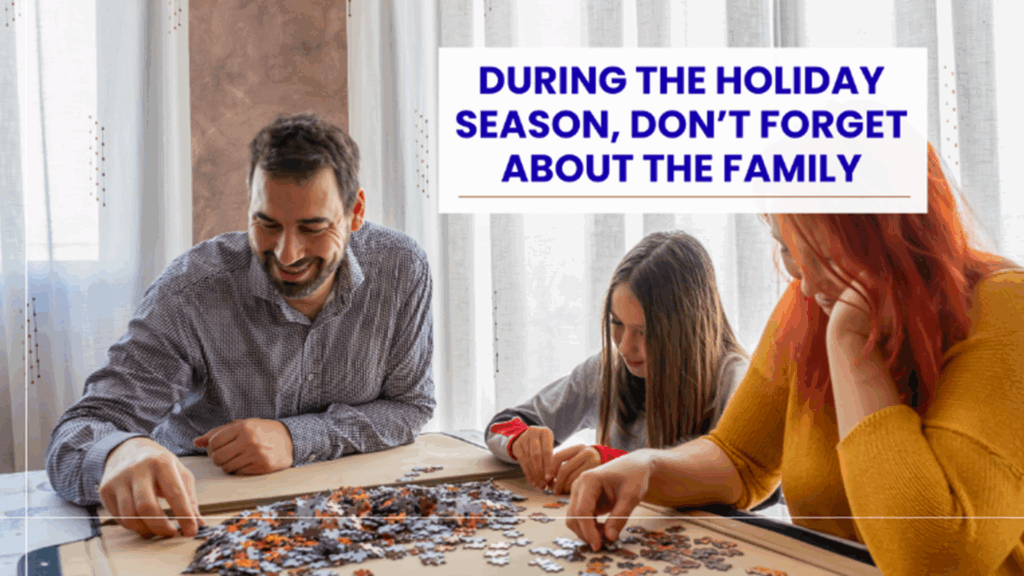Holidays may be fun, exciting, and nostalgic, but they can also create a great deal of anxiety, financial strain, and overwhelmed schedules. Holiday traditions are important to families. They provide stability, strengthen family bonds, and create shared memories with family and friends. Tian Dayton, PhD emphasizes that when families are impacted by substance use disorder, maintaining normal routines during the holiday season give children something to grab on to. It’s a way of keeping the structure of their world feeling reliable and safe. During the holidays, it is important to intentionally keep the spotlight on the people in our families who make our lives meaningful. When we let the chaos of the moment take command, stress and strain can actually be cause for concern, possibly resulting in emotional abuse, neglect, substance use, or physical harm.
When planning this holiday season, remember the family members in your life. Schedule time to unplug from the fast-paced routine and spend time with them – if it is healthy to do so. Family, biological or chosen, can provide a wealth of support, unconditional love, and safety. It doesn’t have to be a huge endeavor – this is a matter of quality over quantity – and the benefits are far more than simply calming the nerves. These times contribute to overall health and wellbeing, improving sleep, reducing blood pressure, lifting mood, and re-energizing interests. Everyone is better once reconnected.
Some great ways to prioritize family
• Enjoy a Meal With Your Family A family meal nurtures each member of the family. Although healthy meals are best for growing bodies, it’s the time preparing, enjoying, and cleaning up the meal together that makes the meal so supportive for families. Benefits of the family include:
o Reduces the likelihood to use alcohol, tobacco, or other drugs. 4X less likely to smoke, 3X less likely to use marijuana, 2X less likely to drink. (*When families share 3+meals together each week)
o Helps build a sense of belonging. Provides an opportunity to come together, strengthen ties, and build better relationships. Allows parents a chance to be role models.
o Helps teach children about family values and traditions.
o Allows families to enjoy each other’s company. Positive communication, the family meal is not a time for difficult conversations or discipline.
o Provides an opportunity for the family to work together. Relationships are enhanced when family members work together to discuss menus, shop, prepare food, and enjoy together. Everyone’s contribution is meaningful!
o Establishes routines. Provides a sense of security. Children thrive on predictability—knowing what will happen and when.
• Gratitude Lists
o About Your Family An attitude of gratitude is such a healing. A daily routine of appreciation and expressing gratitude helps reduce stress, improve health and wellbeing, and improve the feeling of contentment. It increases positive emotions, relishes the good in experiences, and helps bring balance to days plagued with difficulty, anxiety, and/or depression. Including things about your family, your home, or things that happen when your family is together is an important way to prioritize your those you love. Learn more about how to foster this attitude in NACoA’s How to Help Children Develop an Attitude of Gratitude.
o With Your Family This simple activity can be as easy as putting a jar and memo pad out in a family-frequented space, like the kitchen, where everyone can jot down something at any time and put it in the jar. Once a week, after the family meal, consider reading the notes together. For younger kids create a “wall” or construct a tree out of colored paper and tape on the refrigerator, and tape notes and/or pictures on it at any time. Activities like this foster a positive home environment and strengthen the family.
• It Takes a Family, 2nd edition by Debra Jay
This is a great read to help families impacted by addiction step beyond the initial family intervention and reinvent their relationships in a way that builds trustworthiness, prevents relapse, and supports lifelong sobriety. It is a journey the newly recovering loved one and family take together and quickly find an indispensable part of their lives. This second edition of the groundbreaking book by acclaimed interventionist and educator Debra Jay celebrates the unique and powerful role families play in successful long-term recovery from addiction. Readers receive tips, tools, and a framework for pursuing the proven path of Structured Family Recovery.
• Knitting Knitting is more than just a craft—it’s a meditative and therapeutic practice that can bring comfort, connection, and joy to families. For children of parents with a substance use disorder, engaging in positive, creative activities with their caregivers can foster a sense of security and shared purpose. Knitting offers a unique way to bond, reflect, and heal together. Learn more by reading The Power of Knitting: A Craft for Connection, Gratitude, and Letting Go.
• Take a Walk Explore a local park, trail, or neighborhood. Colect leaves, pinecones, or small treasures to decorate your home.
• Host a Family Movie Night Gather everyone’s favorite blankets, pop some popcorn, and enjoy a movie, holiday special, or binge watch a new series together.
• Game Night Pull out board games, play charades, or invent something silly together. To get some ideas, check out these Minute-to-Win-It Games.
• Visit Your Local Library Find your favorite books to read and fames or instruments you can check out and bring home to enjoy throughout the week.
• Cook Together If you need to bring food to an upcoming gathering, or are hosting one, involve the entire family. Pull out your favorite recipes or be daring and prepare something you’ve never made before. As the old adage says, the most important ingredient is love! Find some great assistance with Cooking With Kids.
